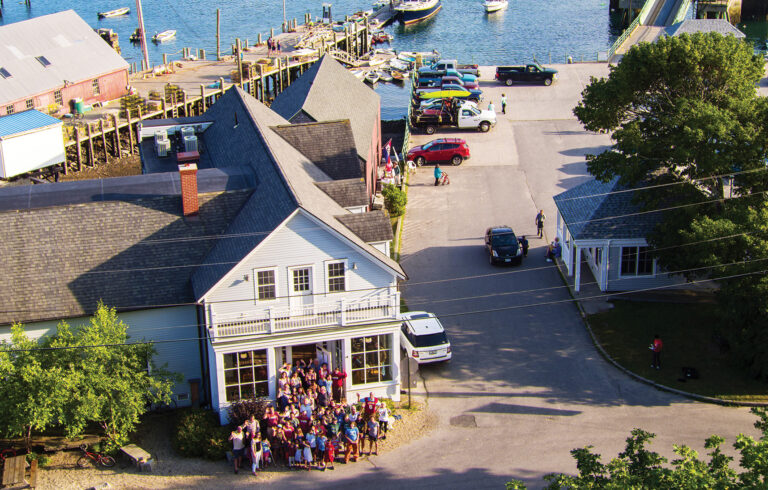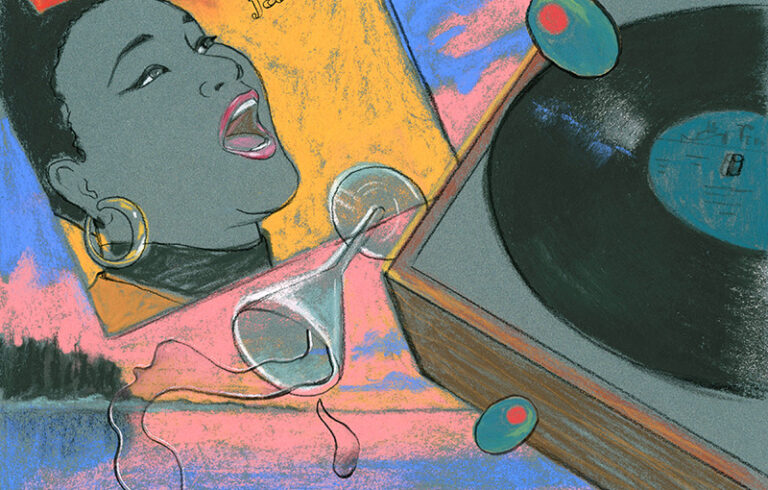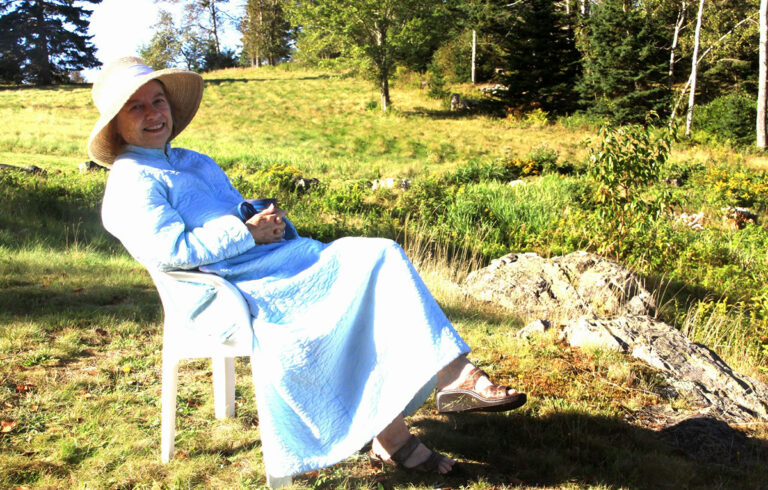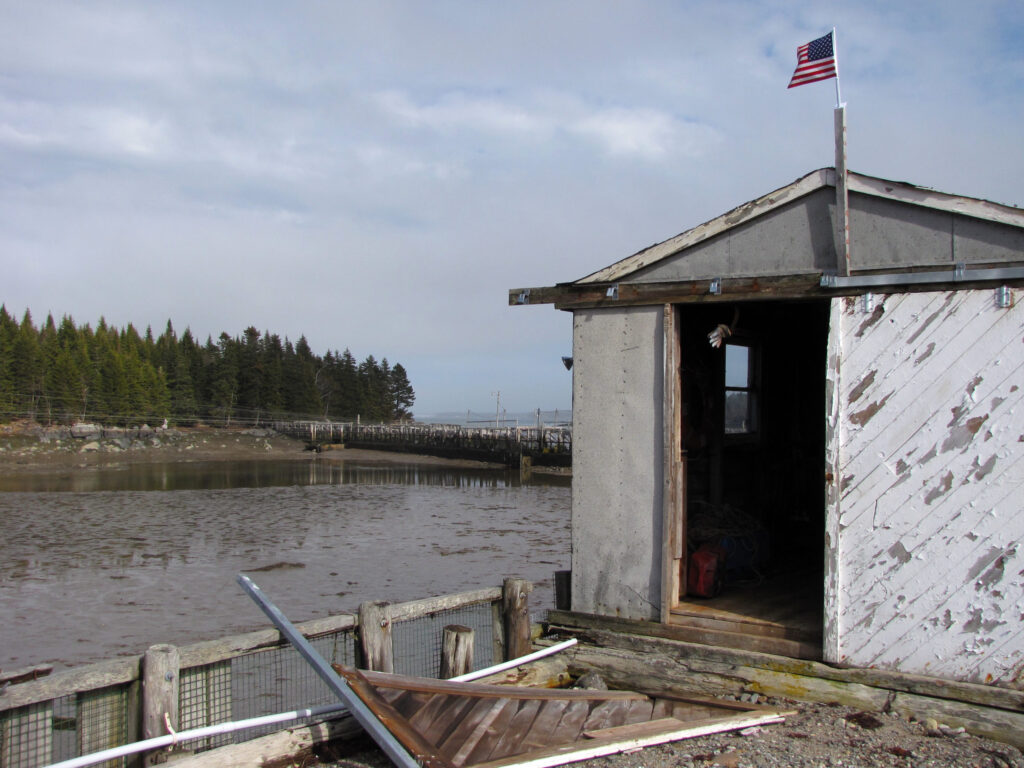
The seagull hangs lifeless and gaunt from a rope. The wind is hard out of the east, leaping over the riprap causeway and flipping the water into neat lines of black and silver. The dead seagull twists in the wind, spins, its eyes now as clouded and gray and lost as the Atlantic skyline.
I stand on an 8-foot by 8-foot feed scow with the lobsterman named Oscar at the tiller. I hold a shovel in my fists. Over a 1,000 pounds of dead fish lie at my feet.
We are being watched by a series of surveillance cameras, and we are surrounded by an electric fence. There is an eagle in a spruce snag and Oscar points a single crooked finger at it as if he knows this bird from all others, and he grumbles, “Asshole.”
The eagle turns its head into the wind, leans forward and spreads its wings and swoops over us, arcs over the harbor and out of sight. Ten feet above us, a series of 100-yard-long nylon cables stretch from one edge of the lobster pound to the other. The cables hang slightly convex, like a drooping ceiling, and the feeling is that of being within an inverted dome with a floor made of seawater. When the wind blows, the cables vibrate and like some massive cello, the lobster pound moans and howls.
This is Oscar’s pound. He owns it with a partner. It’s essentially a low-tech lobster storage facility built out of a natural cove. The head of the cove is reinforced by a riprap causeway that connects the mainland to a small island, thereby protecting it from the battering of open ocean. The cove itself is not much larger than a football field, and it’s shaped like a horseshoe with a concrete dam spanning the open end of the shoe. The lower six feet of the dam is solid concrete with an inch-thick iron clapper in the center so the pound can be drained and cleaned in the spring. The top of the dam holds a wood-slat fence cut from a larch tree that locals call hackmatack and spaced to allow tidewater, but little else, to come and go.
Twice a day the pound is flooded naturally with sea water. When the pound is in use, as it is now, it is capable of holding over 60,000 pounds of lobsters, but how many Oscar and his partner put in there is not going to be written down by me. There are plenty in there. They feed on thousands of pounds of dead fish each week through the fall, and if someone were to fall into the pound, it would be difficult to set a foot on bottom without it landing on a lobster.
Oscar trusts me. We have become close friends despite the fact that he is old enough to be my father. His partner, after six years of knowing me, trusts me to a very limited extent—he trusts Oscar and he knows that Oscar trusts me. That is the way. I am new here, and if I were to have children here, they would be new here, as would their children. That is the way. No one truly moves here, no one steps fully into this world. In western Maine and in Midcoast Maine, in Portland or Camden or Bar Harbor, perhaps; but not in down east Maine. Down east Maine has yet to open itself, and the longer I stay here, the more obvious it becomes that when the door does finally open—as it inevitably will—the place itself will disappear in strict accordance with the swinging of that door.
~
I flip the shovel head upside down and push the fish racks into the water. The racks are the heads and spines and tails that remain after the fillets have been cut at a Canadian fish processor. The racks have been salted, dried and trucked here, and the fish smell nearly sweet. I flip them overboard, spread the meaty skeletons as evenly as possible while Oscar pilots around the small body of water. When he turns the scow side-to the wind, we catch an earful of cable harmonics, a soft hum that rises and falls as the wind gusts and calms.
Oscar shouts. A loud sigh: “Ahh.”
I’m at the bow of the feed scow. It’s more of a raft than a true scow: It has no sides, no gunwales, and only an inch of freeboard, depending on where I stand. Water slops up to my ankles as I turn and look at Oscar. He holds the tiller pinched between his legs and his arms are stretched high. He’s wearing bright orange insulated rubber gloves and he’s working his arthritic fingers as if guitar-plucking the overhead cables.
Far above, a half dozen gulls tilt and soar on shafts of wind.
Oscar has a white beard and the arms of his gray sweatshirt are cut off at the elbows, revealing hard, red, salt-sore skin. His hood is up. He wears black wristlets. In that instant, he reminds me of Charon. “Jesus Christ, Jon,” he says. “It’s beautiful. Isn’t it? Goddamned beautiful. Listen.”
His voice is urgent, nearly pleading, and his face is half-shadowed beneath the hood, and I see a slight glistening in the one exposed eye.
A moment passes.
He grunts and grabs the tiller and turns the scow, swallows, and we resume feeding the lobsters below. And there are plenty of lobsters below. There are tens of thousands of lobsters below.
~
Oscar was born here, raised here, and he fished here most of his life, but he calls himself a half-breed: his mother was from away. His father was a wharf owner and World War II hero whose lineage dates to the first wave of settlement in the harbor where Oscar lives. He met Oscar’s mother in Boston just after the war, and she too was different. She drove hours to take Oscar and his siblings to the library in Bangor to be sure they learned literature. She taught them music and art, and though Oscar’s early schooling was in a one-room schoolhouse with a woodstove in the corner, he went to Hebron on a scholarship, then to Wesleyan on another one.
But academia didn’t take and he bailed.
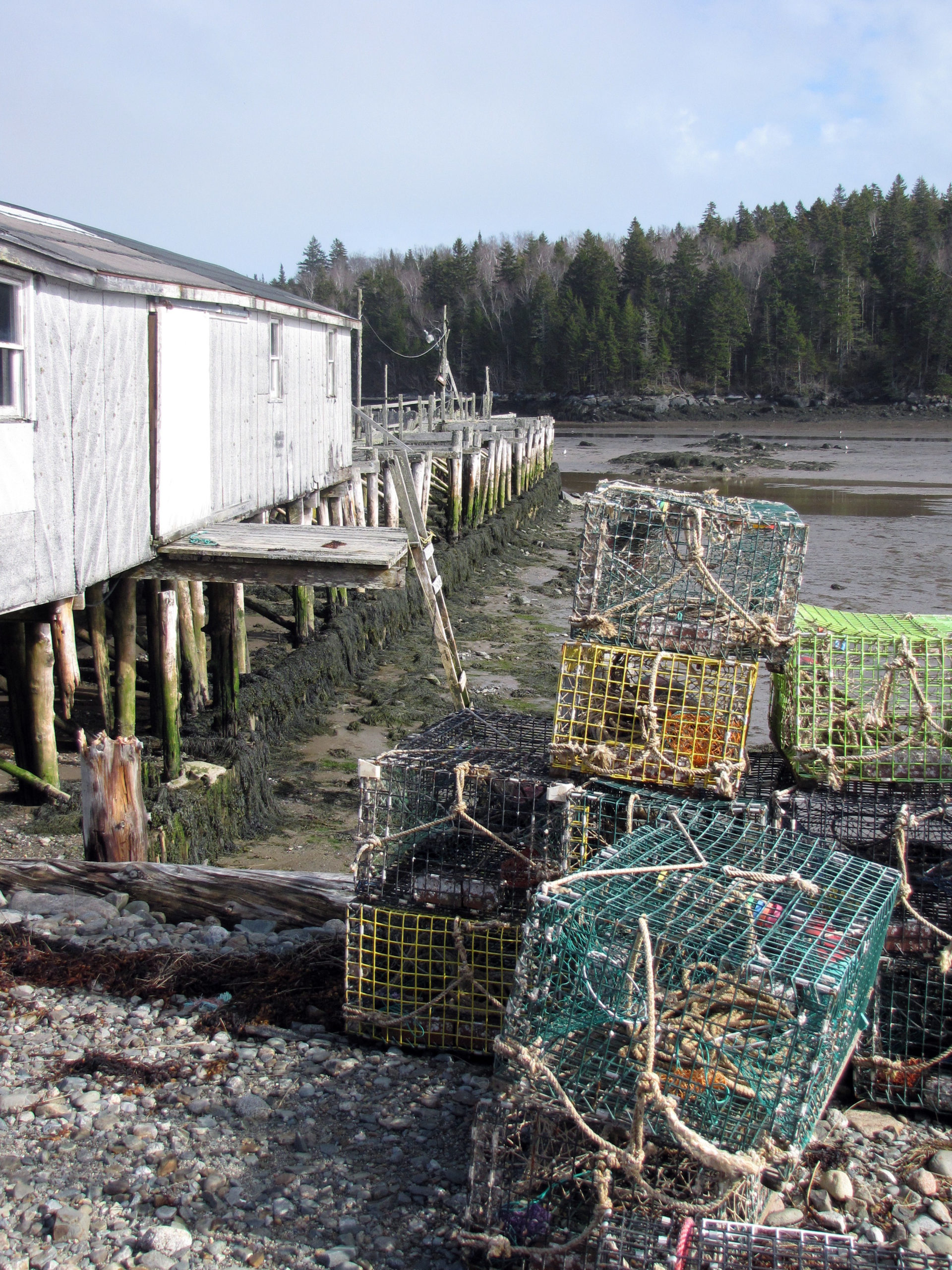
He lived in a small summer cottage beside the wharf with no running water and no power, but years trickled away and slowly he got the itch for something new, something different. He wanted to go. He’d come home and he’d proven himself to a crew of fishermen who’d been his peers right up until the day he left for private high school, but once again he wanted something else, something more.
He was different. He was a half-breed, a lobsterman with a head full of Shakespeare and Miles Davis and Tom Waits and John Donne, but he was also one of the very first guys on that piece of coast to catch 1,000 pounds of lobsters in a single day, which is nothing now, but in the days of wooden traps and small boats was huge. He didn’t go west when the itch to go came this time. Instead he rigged his boat with a tower and pulpit for tuna fishing and he set off offshore with coolers of beer and a grill and a fiberglass tank full of saltwater heated off the engine coils that he and his girlfriend used as an offshore hot tub as they sipped beer and watched gannets and gulls dive on the baitfish that bubbled from the sea while tuna and swordfish swarmed below. He chased and harpooned bluefin tuna from the Canadian border down to Cape Cod and back through the summers, cooked shark steaks and bluefish on the grill and drank beer in the evenings, then returned home each August in order to set his lobster traps in time for fall fishing.
~
It’s a basic concept: fill the pound in early fall when lobsters are cheap, feed them through the winter, and sell when the price peaks. But it’s a gambler’s trade. Most pounds in Maine no longer operate, in large part because a pound is a large investment in a market that’s affected by factors ranging from Canadian fisheries to Icelandic banks to the water temperature on the coast of Maine, and it’s an investment that’s subjected to incredibly harsh natural forces in an environment that they cannot even see.
It takes a certain kind to endure this. It’s not a farm and Oscar and his partner are not buying range cattle and shipping them to a feedlot then sending them to a slaughterhouse. If a cow gets sick, someone shoves a needle into it before the entire herd is infected, but lobsters are underwater and pound keepers have little to no control over what happens on the water’s surface, let alone on bottom. They can hang dead gulls like scarecrows to ward off other lobster-killing black-back gulls. They can string cables across to keep out crows and eagles. They can wrap the place with electric fencing and security cameras to fend off coons and otters and thieves with scuba gear and underwater flashlights, but in the end there is little to be done. A pound isn’t an indoor tank with monitors and aerators and thermostats and filters, nor is it a high-tech multinational fish farm—it’s a few guys in hooded sweatshirts tossing lobsters they caught into a fenced-off cove.
~
Now Oscar flips his hood off. He’s wearing a black baseball cap which reads Mercury. The feed scow is empty and I’m sweating and he turns us back toward the pound building. He releases the tiller and walks with me to the bow of the scow and with the weight, the bow dips below the surface and scoops a sheet of water that rinses the deck free of the remnant salt and bones and fish flesh. He returns to the tiller, and the bow rises, and we cross the pound.
The water is gray and a gentle twilight surrounds us. The eagle is back in the spruce snag, watching, but Oscar ignores it. We sit in his truck in front of the pound building. We smoke cigarettes. I drink beer; he drinks vodka. We watch the water. This is our routine. It’s been several years since I was his sternman, but he still recruits me to help feed the lobsters. Money no longer changes hands between us, and it remains unspoken that whatever one of us can do to help the other will be done. I help him feed lobsters and split firewood and fill in on his boat when he needs it. He lends me tools, gives me lobsters when I have company, and feeds me dinners when I’m alone.
The pound surface is calm despite the fact that not far below, tens of thousands of lobsters are hungrily tackling 1,200 pounds of cod racks. Darkness is falling, and on the far side of the harbor the rocky cape is dropping evening red. Oscar holds his cigarette crunched between his rubber-gloved fingers as he peers out to sea, and the wind sucks a steady line of smoke out the gap in the window.
We don’t say much because there’s nothing to say. I am leaving the harbor for a while—most of my things are stuffed into Oscar’s garage. I’ve been living here for eight years, longer than any place I’ve lived since childhood, and I’ve been here largely because Oscar gave me a job and thus access to a community from which I otherwise would have been shunned.
When his cigarette is nearly gone, he turns the radio down—it’s Jakob Dylan, the same CD that has been stuck in the player for two years now. “You know what, Mister Man,” he says, then pauses and in the quick silence I hear the hum of the pound cables like something on the back of my neck. Then he sighs and his shoulders and chest drop. He sucks beads of vodka from his mustache. “This ain’t bad,” he whispers. “This right here. Feeding the bugs, watching the sunset. Where would you rather be?”
I nod to him and say nothing. There’s no answer. We both know why I have to leave—it’s the same reason he left, the same reason he rigged his boat with tuna gear and took off each summer when he was my age—and I’m grateful that he hasn’t made me try to explain it. So I wait and secretly hope that he’s come up with some solution that will enable me to stay here forever.
“Did I tell you I caught a codfish yesterday? The thing is beautiful. He was absolutely gorgeous, coming up in my trap. Christ, his belly looked like the sky. Deep. Opaque. Fucking endless.” He makes a motion like simulating an explosion with his hands and the explosion stems from his temples as if he cannot fathom the codfish. I’ve seen him make the same motion when listening to Lang Lang or Miles Davis or reading certain poems out loud at his dinner table, or even watching something closely—a spider, a dragonfly, a gannet, a sunset.
Then he grunts, clears his throat, grins a child’s grin. “So I cracked him on the skull and put him in a bucket of seawater.”
He reaches slow into the back seat and grabs a plastic grocery bag. He sets it between us and carefully unfolds the bag and fishes out a beer. He opens it with an opener from his dashboard and hands it to me. He’s got one more beer in there and it’s wrapped together with a blue plastic ice pack. He refolds the bag and sets his gloves on top of it.
“I woke up thinking about that codfish last night. I couldn’t sleep after a dream like that. He was in my dreams, Mister Man. Goddamn codfish dreams. I’m getting old—I used to dream about tuna. That’s a power animal. You see them rip through the water out there and you never forget it. Cod are goddamned groundfish bottom feeders. That’s where my dreams have gone. So, I got up and sliced him and salted him and went out to the shop and got my drying racks out, then I called my old friend Don because it was already four in the morning, and he should be awake. You know what he said? He told me that monarch butterflies take several generations to get where they’re going, then he hung up.”
Oscar leans his head back and laughs, a quick bark of a laugh that turns into a full chest rumble. I sip my beer.
“Four in the morning and my hands smell like codfish and I got codfish in my dreams instead of tuna and he tells me that. Several generations. My father used to tell me to take care of my feet and never miss a chance to take a piss.”
With that he starts the truck and slowly backs up without turning his head. His gaze stays transfixed on the pound, as if he’s seeing something that I am not, and I suppose that after looking at this same spot for nearly 65 years, he is.
He turns the truck around and eases down the dirt road, onto the pavement and up the hill, then down the long driveway to my house. He lets the truck idle as we both get out, then he nods and says, “I couldn’t of done it without you.”
He puffs his chest and sighs. It’s dark up there in the trees, but we can see a lightness which is the ocean through the branches, and we hear the faint moan of the cables that protect the pound. I know he wants me to stay, to marry, to have children who will grow up in the harbor because there are so few left and no prospects to replace those few when they grow up and leave, but he doesn’t mention wives or children to me now, only looks down at his rubber boots, shakes his head and exhales slowly and loudly, then grins beneath his white beard, makes a slight gesture with his hands to indicate that probably we should hug, then says, “Well alright, Mister Man. Carry on.”

